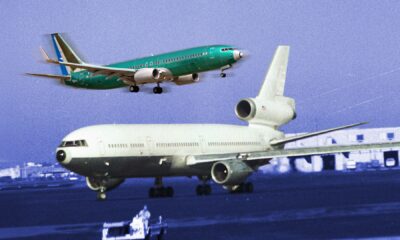World
Major Brands Face Scrutiny Over BPA in Baby Dummies

A recent investigation has revealed that baby dummies from three prominent European brands contain bisphenol A (BPA), a chemical associated with various health risks, including low sperm count, obesity, and certain cancers. The findings, published by dTest, a consumer organization based in the Czech Republic, have raised alarms among parents and health advocates.
Laboratory tests identified BPA in dummies produced by the Dutch multinational Philips, the Swiss company Curaprox, and the French brand Sophie la Girafe. All three brands had previously marketed their products as “BPA-free” or made from “natural rubber,” leading to concerns over consumer trust.
BPA is a synthetic chemical commonly used in plastic production. It mimics the female hormone oestrogen, which can disrupt hormonal balance in humans and animals. Chloe Topping, a campaigner with Chem Trust, emphasized the extensive health risks associated with BPA exposure, particularly for children.
“Children are particularly vulnerable because they’re still developing, and their organs are very sensitive to disruption,” Topping noted. She highlighted the link between early exposure to BPA and adverse developmental outcomes, including reduced sperm counts and early onset puberty.
The dTest study examined 19 baby dummies purchased from retailers in the Czech Republic, Slovenia, and Hungary, along with two sourced from the online marketplace Temu, produced by Foshan City Saidah Baby Products. To simulate conditions inside an infant’s mouth, each dummy was placed in an artificial saliva solution for 30 minutes at a controlled temperature of 37°C (98.6°F). The extracts were then analyzed for BPA content.
Of the four dummies that tested positive for BPA, the highest concentration was found in the Curaprox “baby grow with love” soother, which contained 19 micrograms per kilogram (μg/kg). This level exceeds the European Union’s established limit of 10μg/kg for BPA migration from baby dummies. The second highest concentration was detected in Sophie la Girafe’s pacifier, which had 3μg/kg of BPA, while Philips’ Avent ultra air soother and one from Foshan City Saidah contained 2μg/kg and a similar amount, respectively.
Following the findings, Curaden, the manufacturer of the Curaprox range, expressed surprise at the results and conducted its own tests that confirmed the presence of BPA. A company spokesperson stated, “Out of an abundance of caution and in line with our commitment to quality, Curaden immediately decided to proactively remove the soothers from affected batches from the market and to offer refunds to all affected customers.”
Vulli, the company behind Sophie la Girafe, defended its product, stating that it had not sold the pacifier for some time. A spokesperson emphasized that all products undergo rigorous testing by accredited laboratories. “The value mentioned in the article (3μg/kg) is well below the detection limit,” they asserted, underscoring that the regulatory limit for BPA migration is set at 0.04 mg/kg.
Philips reiterated its commitment to safety, stating that it ensures full compliance with all safety requirements and conducts regular tests to confirm its products remain BPA-free. “Following news about the Philips Avent SCF085/60 soother, we have checked our results and conducted further tests with DEKRA, the world’s largest independent testing, inspection, and certification organization,” a spokesperson said.
The findings have sparked debate over the regulatory framework governing BPA in consumer products. The current EU regulations on BPA in dummies remain ambiguous. While the EN 1400 standard imposes a 10μg/l limit for BPA migration from baby dummies, the European Toy Safety Directive, which also encompasses soothers, sets a higher limit of 40μg/l. Since 2011, the EU has outright banned BPA in baby bottles, and regulations were expanded in 2018 to include food containers for children under three years old.
Karolína Brabcová, a representative from the Czech campaign group Arnika, criticized the inconsistency in regulations. “It is illogical that bisphenols are banned in baby bottles but not in pacifiers, which babies use more intensively and in some cases for long years,” she remarked.
The ongoing conversation about BPA in baby products underscores the need for clearer and stricter regulations to safeguard consumers, particularly vulnerable groups like infants. As more parents become aware of potential risks, the demand for transparency in product safety is likely to grow.
-

 Science2 months ago
Science2 months agoUniversity of Hawaiʻi Joins $25.6M AI Project to Monitor Disasters
-

 Business2 months ago
Business2 months agoForeign Inflows into Japan Stocks Surge to ¥1.34 Trillion
-

 Top Stories2 months ago
Top Stories2 months agoBOYNEXTDOOR’s Jaehyun Faces Backlash Amid BTS-TWICE Controversy
-

 World2 months ago
World2 months agoBoeing’s Merger with McDonnell Douglas: A Strategic Move Explained
-

 Top Stories2 months ago
Top Stories2 months agoCarson Wentz Out for Season After Shoulder Surgery: Urgent Update
-

 Entertainment2 months ago
Entertainment2 months agoSydney Sweeney Embraces Body Positivity Amid Hollywood Challenges
-

 Top Stories2 months ago
Top Stories2 months agoMarc Buoniconti’s Legacy: 40 Years Later, Lives Transformed
-

 Lifestyle2 months ago
Lifestyle2 months agoKelsea Ballerini Launches ‘Burn the Baggage’ Candle with Ranger Station
-

 Health2 months ago
Health2 months agoInnovative Surgery Restores Confidence for Breast Cancer Patients
-

 Sports2 months ago
Sports2 months agoSteve Kerr Supports Jonathan Kuminga After Ejection in Preseason Game
-

 Entertainment2 months ago
Entertainment2 months agoZoe Saldana Advocates for James Cameron’s Avatar Documentary
-

 Lifestyle2 months ago
Lifestyle2 months agoDua Lipa Celebrates Passing GCSE Spanish During World Tour









